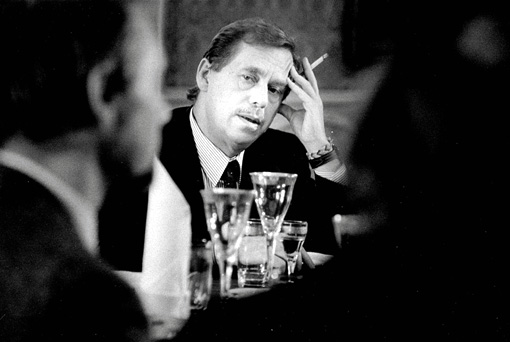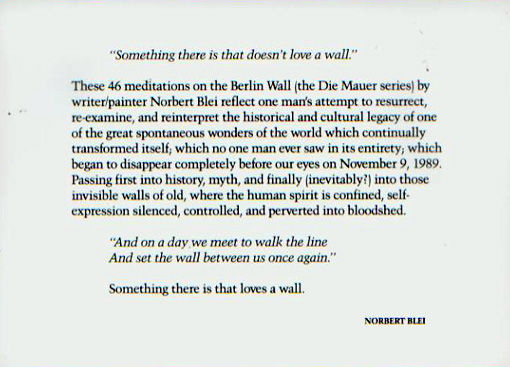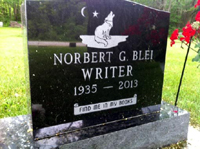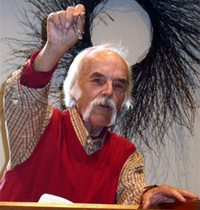
NOTES from the UNDERGROUND No. 203 | November 17, 2009
VÁCLAV HAVEL
(Writer and ‘Revolution’)
This is the 20th Anniversary of the Velvet Revolution, which led to the downfall of the Soviets in Czechoslovakia and the creation of the Czech Republic. Havel, one of my heroes, who speaks to a large part of my heritage, the human condition, the artist as statesman, not to mention the ‘writer as witness’…ailing, much older, was there to deliver the opening remarks in celebration of the student uprising that took place in Prague on November 17, 1989.
Times there have changed—for better and worse—but Havel lives on. Still speaks with such power, depth, common sense, that I thought it perfect and appropriate to go back to his book of 1990 and revisit the real poetry of power. If you have never read him, seen his plays, heard him interviewed…you will sense immediately the man’s heart, vision…self-deprecation.
Not many artists or writers of his caliber find themselves thrust into the role of national politics. I sometimes speculate / compare one American playwright who might have been our Havel had circumstances here proved similar.
Only one man of words comes close: Arthur Miller. –norbert blei

 You’ve evaluated yourself as a playwright; how would you evaluate yourself as a person? …perhaps this might be an occasion for some self-reflection…
You’ve evaluated yourself as a playwright; how would you evaluate yourself as a person? …perhaps this might be an occasion for some self-reflection…
It’s a diabolical task, and the first and only thing I can say about it right now is that my life, my work, my position, everything I’ve done, seems intertwined with a suspiciously large number of paradoxes. Take this one, for instance: I get involved in many things, yet I’m an expert in none of them. Over the years, for example, I’ve become known as a political activist, but I’ve never been a politician, never wanted to be one; I don’t have any of the necessary qualities for it. Both my opponents and my supporters see me as a political phenomenon, though nothing I do can be considered real politics. Every once in a while I philosophize—yet what kind of philosopher am I anyway? Certainly I’ve enjoyed reading philosophical books since my youth, but my philosophical education is more than shaky, and thoroughly piecemeal. I occasionally write about literature—yet, if there’s anything I most certainly am not, it’s a literary critic. There are times when I even stick my nose into music, and yet, if anything, my musicality is only a source of general amusement. Even in what I would consider my chief, original vocation—theatre— I’m not really an expert. I went through theatre school quickly and without much interest; I don’t like reading plays or books on theatre; I don’t enjoy going to most theatre; I have a personal opinion, of sorts, about the kind of theatre I like, and I write my plays in that spirit, but that’s all.
So I’m not at all certain that theatre is my very own, unique and indispensable mission. I can easily imagine that, if an irresistible opportunity were to come my way, I could just as easily devote the same amount of energy to another discipline. I certainly don’t feel like a professional theatre person, one inevitably drawn to theatre, whose destiny is forever linked with the theatre. And rather than be a dramaturge in any old theatre just because I’ve been trained to be one, I’d prefer to go back to working in a brewery. In any case, as a dramatist I’m somewhat suspect: I can write in my own highly particular way, within the limits of my narrowly defined poetics, but if I had to write something that even slightly departed from that, I would probably be a miserable failure.
In general, then, though I have a presence in many places, I don’t really have a firm, predestined place anywhere, in terms of neither my employment, nor my expertise, nor my education and upbringing, nor my qualities and skills. I’m not saying that airborne, unrooted, disturbing existences such as mine are not necessary. But this alters nothing in the paradoxical tension between the seriousness with which I am accepted and my amateurism. The list of my private paradoxes doesn’t end here, it’s just the beginning. Some others, at random: I have chosen a rather agitated way of life, and I myself am always ruffling the surface somewhere, yet I long for nothing more than peace and quiet. I have an extraordinary love of harmony, comfort, agreement, and friendly mutual understanding between people (I’d be happiest if everyone simply liked everyone else, always); tension, conflict, misunderstanding, uncertainty, and confusion upset me; yet my position in the world always has been and continues to be deeply controversial. I’ve been in conflict with the state and with various institutions and organizations all my life; my reputation is that of an eternal rebel and protester, to whom nothing is sacred; and my plays are anything but a picture of peace and harmony. I’m very unsure of myself, almost a neurotic. I tend to panic easily; I’m always terrified of something, scared even that the telephone might ring; I’m plagued by self-doubts, and I’m always masochistically blaming or cursing myself for something; yet I appear to many (and to a degree rightly so!) as someone who is sure of himself, with an enviable equanimity, quiet, levelheaded, constant, persistent, down-to-earth, always standing up for himself. I am rational and systematic, I love order and orderliness; I am disciplined and reliable, at times almost bureaucratically pedantic; at the same time I’m oversensitive, almost a little sentimental, someone who’s always been drawn by everything mysterious, magic, irrational, inexplicable, grotesque, and absurd, everything that escapes order and makes it problematic. I’m a sociable person who likes being with people, organizing events, bringing people together; a cheerful fellow, sometimes the conversational life of the party, one who enjoys drinking and the various pleasures and trespasses of life—and at the same time I’m happiest when alone, and consequently my life is a constant escape into solitude and quiet introspection.
You pointed to another paradox yourself a while ago, and even though I was able to show that it wasn’t really a paradox, I admit that it must seem that way: I write mercilessly skeptical, even cruel plays—and yet in other matters I behave almost like a Don Quixote and an eternal dreamer, foolishly struggling for some ideal or another. At my core I’m shy and timid—and yet in some forums I’m notorious as a rabble-rouser who is not afraid to say the toughest things right to someone’s face. Or something else, which I’ve already mentioned in another connection: for many people I’m a constant source of hope, and yet I’m always succumbing to depressions, uncertainties, and doubts, and I’m constantly having to look hard for my own inner hope and revive it, win it back from myself with great difficulty, so that I scarcely seem to have any to give away. So I’m not really comfortable in the role of a distributor of hope and encouragement to those around me, since I’m always on the lookout for some encouragement myself. I come across as one who is steadfast and brave, if not hardheaded, who did not hesitate to choose prison when far more attractive options were offered him— and there are times when I have to laugh at my reputation. The fact is, I’m always afraid of something, and even my alleged courage and stamina spring from fear: fear of my own conscience, which delights in tormenting me for real and imaginary failures. And all that heroic time in prison was in fact one long chain of worries, fears, and terrors: I was a frightened, terrified child, confusedly present on this earth, afraid of life, and eternally doubting the rightness of his place in the order of things; I probably bore prison worse than most of those who admired me would. Whenever I heard the familiar shout in the hallways, “Havel!,” I would panic. Once, after hearing my name yelled out like that, I jumped out of bed without thinking and cracked my skull on the window. And with all this, and despite all this, I know that, if it were necessary, I would go back to prison again, and I would survive.
I could make a long list of such paradoxes, but my reluctance to talk about myself in public is gradually winning out over my good will in wishing to answer your questions truthfully, so I’ll conclude with some questions that I sometimes ask myself: How does it all fit together? Why don’t these paradoxical qualities cancel each other out instead of coexisting and cooperating with each other? What does all this mean? What should I think about it all? How can I—this odd mix of the most curious opposites—get through life, and by all reports successfully?
One final question. Given this awareness of yourself, how do you see your future? What do you think is awaiting you? What do you hope for, and what do you expect?

The paradoxes will continue. I’ll go on, as I’ve always done, sitting down in front of a blank piece of paper with distaste; I will try everything to avoid writing, always terrified of those first words on the page. I will continue to find artificial ways of giving myself the courage to write. I will despair that it’s not coming, yet I’ll always manage to write a new play. The mysterious inner furies who have invented these torments will probably not leave me in peace and will have their own way in the end. As always, I will be upset by all the expectations (many of which are out of proportion and even foolish) that I’m burdened with, and all the roles, from the representative to the Good Samaritan, that are prescribed for me. I will continue to revolt against them and reclaim my right to peace—and I will ultimately carry out all these tasks and even find sincere delight in doing so. I will go on being bothered by things, fearing some things, getting into states, blaming myself, cursing, and despairing—and, as always, I will be found reliable and will be seen where my place is. I’ll always end up paying for it, but, oddly enough, I’ll survive and be there, causing disruption wherever necessary.
I can only conclude this prediction, and our conversation, by attempting to articulate the final and obviously the most paradoxical paradox of my life: I suspect that somewhere, deep down, I find this paradoxical life of mine terribly entertaining.
[from DISTURBING THE PEACE, Václav Havel, A Conversation with Karel Hvίžďala. translated by Paul Wilson. Knopf, 1990]




 You’ve evaluated yourself as a playwright; how would you evaluate yourself as a person? …perhaps this might be an occasion for some self-reflection…
You’ve evaluated yourself as a playwright; how would you evaluate yourself as a person? …perhaps this might be an occasion for some self-reflection…











































































Recent Comments